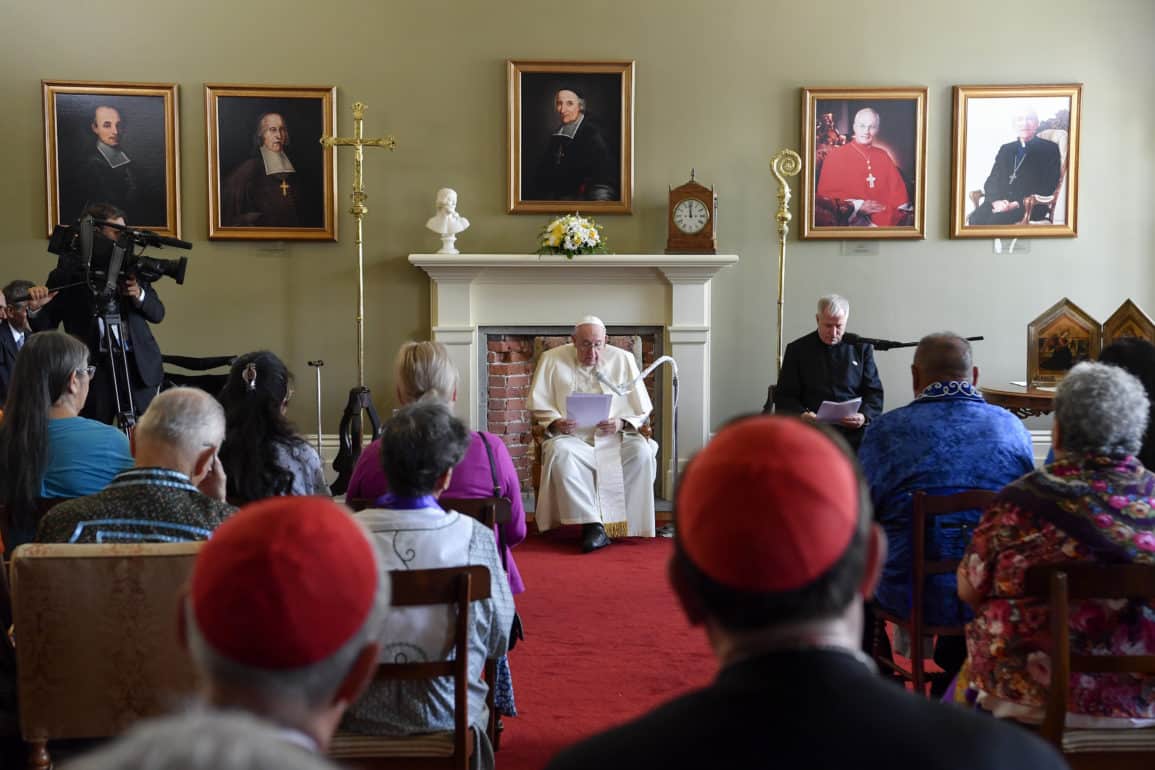This morning, after celebrating Holy Mass in private, the Holy Father Francis met privately with the members of the Society of Jesus present in Canada. Then, at 10:45 a.m. (4:45 p.m. Rome time), the pope met with a delegation of Indigenous people present in Quebec at the Archbishopric.
During the meeting, Pope Francis greets the Delegation of Indigenous Peoples and at the end greets them individually.
At the end of the meeting, after saying goodbye to the staff of the Archbishopric, he drove to Quebec International Airport from where, at 12.45 (18.45 Rome time) – aboard an A330 / ITA Airways – he departed for Iqaluit.
The following is the Pope’s greeting to the Delegation of Indigenous Peoples present in Quebec:
Greeting from the Holy Father
Dear brothers and sisters,
I offer all of you a warm greeting and I thank you for coming here from various places. The vastness of this land makes us think of the lengthy path of healing and reconciliation that we are facing together. Indeed, the phrase that has accompanied us since March, when the indigenous
delegates came to visit me in Rome, and inspires my visit here among you, is Walking Together/Marcher Ensemble.
I have come to Canada as a friend in order to meet you and to see, hear, learn and appreciate how the indigenous populations of this country live. I have come as a brother, to discover firsthand the good and bad fruit borne by members of the local Catholic family in the course of the years. I have come in a spirit of penance, to express my heartfelt pain at the wrong inflicted on you by not a few Catholics who supported oppressive and unjust policies in your regard. I have come as a pilgrim, despite my physical limitations, to take further steps forward with you and for you. I do this so that progress may be made in the search for truth, so that the processes of healing and reconciliation may continue, and so that seeds of hope can keep being sown for future generations – indigenous and non-indigenous alike – who desire to live together, in harmony, as brothers and sisters.
Now that I am nearing the end of this intense pilgrimage, I want to tell you that although I came with these desires, I am now returning home greatly enriched. I bear in my heart the incomparable treasure of all those individuals and peoples who have left a mark on me; the faces,
smiles and messages that remain with me; the unforgettable stories and natural beauties; the sounds, colours and emotions that touched me deeply. I can truly say that, while I came to be with you, it was your life and experiences, the indigenous realities of these lands, that have touched me, remained with me, and will always be a part of me. I dare say, if you will allow me, that now, in a certain sense, I also feel a part of your family, and for this, I am honoured. The memory of our celebration of the feast of Saint Anne, with different generations and so many indigenous families, will always be impressed on my heart. In a world that, tragically, is often all too individualistic, how precious is your profoundly genuine sense of family and community. How important it is to cultivate properly the bond between young and old, and to maintain a healthy and harmonious relationship with all of creation!
Dear friends, I would like to entrust all that we have experienced in these days, and our pursuit of the path that lies ahead, to the loving care of those who best understand how to protect the most important things in life. I am thinking of women, and of three women in particular. First, Saint Anne, whose tenderness and protection I could sense as I venerated her, together with a people of God that respects and honours its grandmothers. Second, I think of the Holy Mother of God: no creature deserves to be called a pilgrim more than Mary, for she is always, even today, even at this moment, a pilgrim, treading the path between heaven and earth, in order to show us God’s care and to lead us by the hand to her Son. Finally, my thoughts and prayers in these days have focused on a third woman, whose quiet presence has accompanied us and whose remains are kept not far from here. I am thinking of Saint Kateri Tekakwitha. We venerate her for her holy life, but we can well imagine that her sanctity, marked by an exemplary devotion to prayer and work, and her ability to endure many trials with patience and meekness, were also made possible by certain noble and virtuous traits inherited from her community and the indigenous environment in
which she grew up.
These women can help us to come together, and start to weave anew a reconciliation that can uphold the rights of the most vulnerable in our midst and look at history without resentment or forgetfulness. Two of them, Our Lady and Saint Kateri, received from God a plan for their lives, and, without asking any man, courageously assented to it. Those two women could have responded irately to anyone who opposed that plan, or simply submitted to the patriarchal rules of the time and given up, without battling for the dreams that God himself had inspired in them. They chose not to do that, but instead, with meekness and determination, with prophetic words and decisive gestures, they blazed a trail and accomplished what they had been called to do. May they bless the journey we now share, and intercede for us and for this great work of healing and reconciliation that is so pleasing to God. I bless all of you from my heart. And I ask you, please, to continue to pray for
me. Thank you!










